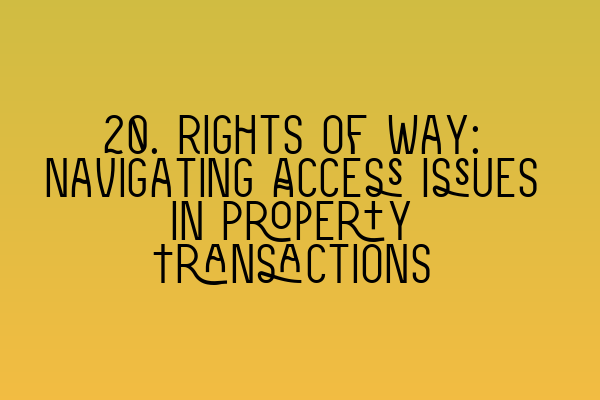20. Rights of Way: Navigating Access Issues in Property Transactions
When it comes to buying or selling a property, there are many legal issues that need to be considered. One crucial aspect is the right of way, which refers to the legal permission granted to individuals to cross another person’s land to access their own property or a public area. This right of way can be a critical factor in determining the value and usability of a property. It is, therefore, essential for both buyers and sellers to have a clear understanding of the rights of way involved in a property transaction.
In this article, we will delve into the intricacies of rights of way and explore how they can impact property transactions. Whether you are a solicitor, a property buyer, or a seller, this guide will equip you with the knowledge needed to navigate access issues effectively.
1. What is a Right of Way?
A right of way is a legal right that enables someone to pass through another person’s land for a specific purpose. It provides the right holder with a legally enforceable access route, allowing them to enter or exit their property. This access could be in the form of a pathway, driveway, or road.
2. Types of Rights of Way
There are two primary types of rights of way:
- Express Rights of Way: These are rights that are granted explicitly in a written document. They can be created in various ways, such as in a transfer of land or by a lease agreement.
- Implied Rights of Way: These are rights that are not explicitly mentioned but are deemed necessary due to the circumstances. Implied rights of way are often created by longstanding use of an access route.
Understanding the type of right of way involved in a property transaction is vital for ensuring a smooth transfer of ownership.
3. Investigating Rights of Way
When buying or selling a property, it is crucial to thoroughly investigate any rights of way associated with the land. This involves conducting a comprehensive search to identify existing rights of way and examining official records, title deeds, and any relevant agreements. The goal is to obtain accurate and up-to-date information about the rights of way to avoid any potential disputes or complications later on.
4. Factors to Consider
There are several factors to consider when dealing with rights of way:
- Location and Width: The precise location and width of the right of way should be established to ensure that it meets the requirements of all parties involved. This information should be clearly defined in the relevant documentation.
- Maintenance Responsibilities: It is crucial to determine who is responsible for maintaining the access route. This maintenance obligation may vary depending on the type of right of way and the agreements in place.
- Restrictions and Limitations: It is essential to be aware of any restrictions or limitations imposed on the right of way. These could include time restrictions, load restrictions, or limitations on the type of vehicles allowed.
By considering these factors, both buyers and sellers can ensure that the rights of way are clearly understood and agreed upon.
5. Resolving Disputes
In some cases, disputes may arise regarding rights of way. These disputes can be complex and can often lead to legal proceedings. It is advisable to seek legal advice from a qualified solicitor experienced in property law to resolve any disputes effectively.
It is worth noting that disputes can also arise if a property owner obstructs or interferes with another person’s right of way. Such actions can have serious legal consequences, including legal claims and potential damages.
6. Importance of Legal Representation
Given the complexity of rights of way and their significance in property transactions, it is essential to seek professional legal representation. A solicitor specializing in property law can provide invaluable advice and guidance throughout the buying or selling process.
Experienced solicitors can help identify any potential issues or risks associated with rights of way, conduct thorough investigations, and negotiate agreements that protect the rights and interests of their clients.
Conclusion
Rights of way are a critical aspect of property transactions. Whether you are buying or selling a property, it is essential to have a comprehensive understanding of the rights of way involved. Thorough investigation, careful consideration of factors, and seeking professional legal representation are key to ensuring a smooth and successful property transaction.
If you need expert legal advice or assistance with property law, SQE Property Law & Land Law is here to help. Our team of experienced solicitors specializes in property law and can provide the guidance you need. Contact us today for a consultation.
Related Articles:
